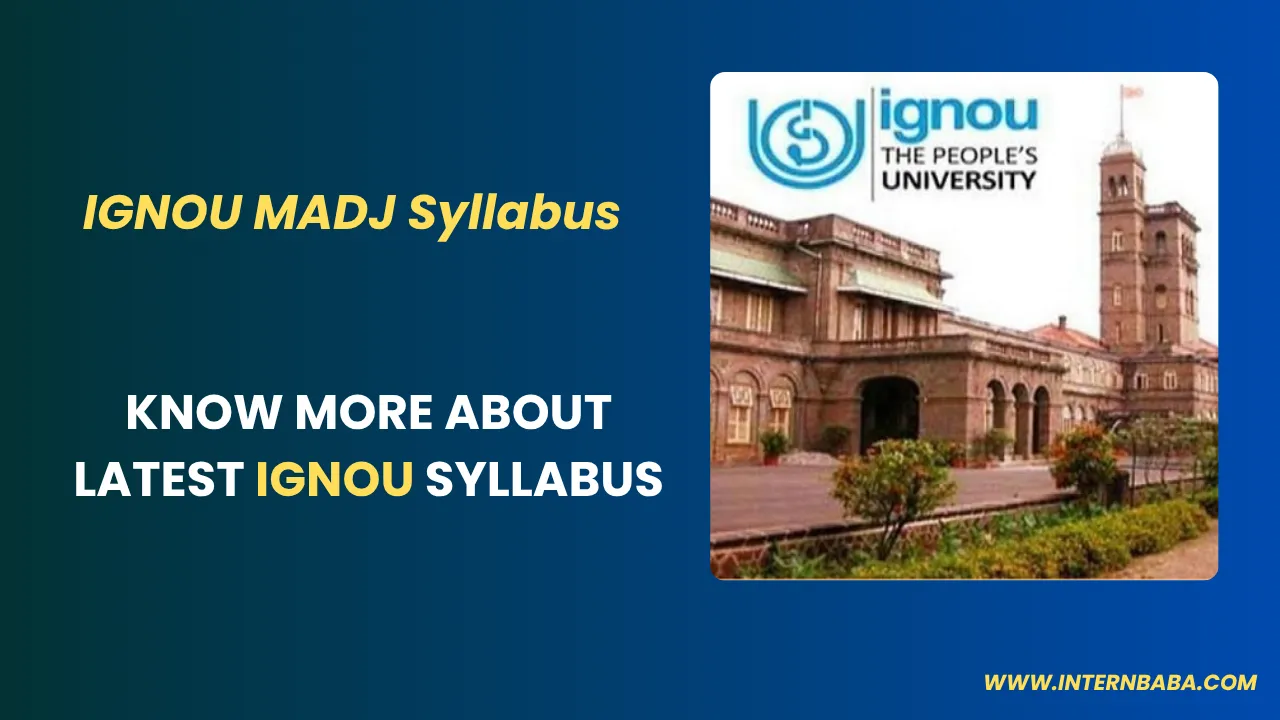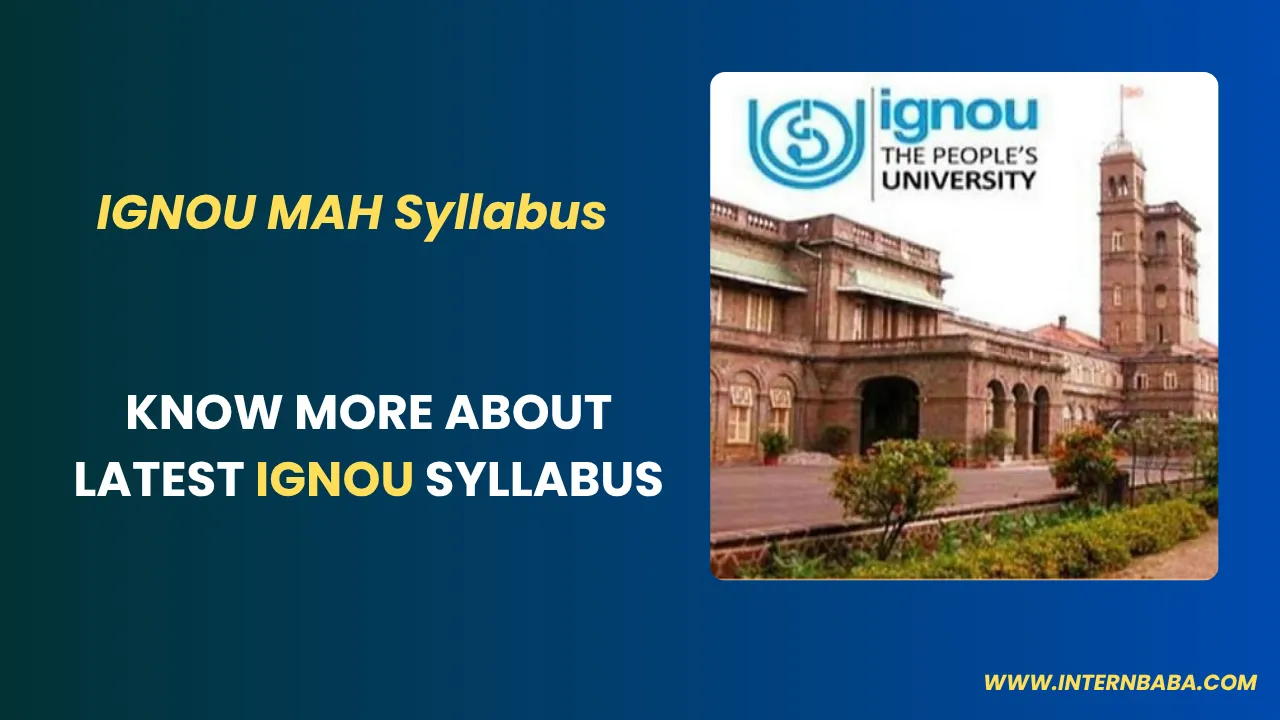IGNOU MADJ Syllabus 2025

If you’re planning to pursue the Master of Arts in Development Journalism (MADJ) from IGNOU, you’re in the right place. The 2025 syllabus has been carefully structured to equip students with both theoretical knowledge and hands-on skills needed in the domain of journalism that focuses on development and social change. Whether you are a working professional aiming to sharpen your expertise or a fresher looking to step into the world of development journalism, this detailed guide to the IGNOU MADJ syllabus 2025 will help you plan your academic journey efficiently.
From compulsory core courses to elective options and project work, this program blends the concepts of communication, media, research, and development in a well-organized manner. Let’s explore all the aspects of the MADJ program including credit requirements, subject breakdown, and learning methodology.
Highlights of IGNOU MADJ Syllabus 2025
| Particulars | Details |
|---|---|
| Program Name | Master of Arts (Development Journalism) |
| Credit System | Annual |
| Total Credits Required | 72 |
| Program Category | IGNOU MADJ |
IGNOU MADJ Syllabus Structure 2025
The Master of Arts (Development Journalism) is a two-year postgraduate program. It consists of a well-balanced combination of core and elective subjects spread across four semesters. The structure emphasizes topics like development communication, media theory, digital platforms, and field-based journalism. The curriculum is revised periodically to reflect new trends and practices in journalism and development sectors.
This course is especially beneficial for students who want to pursue a career in development journalism, social advocacy, public communication, or research-based reporting. It builds analytical, writing, and field research skills necessary to report and analyze development issues critically.
First Year Courses (Compulsory)
| Course Code | Course Title | Credits |
| MDC-01 | Fundamentals of Development and Communication | 6 |
| MJM-30 | Media and Communication Theories | 6 |
| MDC-02 | Human Development and Communication | 6 |
| MDC-03 | Media in Development Communication | 6 |
| MDC-04 | Development Journalism for Social Change | 6 |
| MDC-05 | Development: Information Communication Technologies | 6 |
Total Credits (First Year): 36
These foundational courses cover the essentials of communication in a development context. Students learn how media plays a role in societal change, how to craft development stories, and how to use communication technology effectively.
Second Year Courses (Compulsory)
| Course Code | Course Title | Credits |
| MDJ-01 | Health Journalism | 6 |
| MDJ-02 | Environmental Journalism | 6 |
| MDJ-03 | Development Through Digital Media | 6 |
| MDCE-06 | Research Methods in Development Communication | 6 |
Total Credits (Second Year Core): 24
These advanced courses delve into niche areas like health and environment reporting, use of digital tools, and how to conduct impactful communication research in development settings.
Elective Courses (Select Any One)
| Course Code | Course Title | Credits |
| MRDE-203 | Communication and Extension in Rural Development | 6 |
| MRD-203 | Rural Development Planning and Management | 6 |
Elective courses allow students to tailor the program to their interests, especially if they are looking at rural development, policy research, or communication outreach in rural areas.
Project Work (Select Any One)
| Course Code | Project Title | Credits |
| MDJP-04 | Dissertation | 6 |
| MDJP-05 | Production Portfolio | 6 |
The project work or dissertation provides students with a chance to apply theoretical knowledge to real-world scenarios. It also strengthens research and investigative journalism skills, critical for a development journalist.
Total Credits Breakdown
The total number of credits for the MADJ program is 72. This includes:
- 36 credits from first-year compulsory courses
- 24 credits from second-year compulsory courses
- 6 credits from one elective course
- 6 credits from one project/dissertation
| Component | Credits |
| First Year (Core Courses) | 36 |
| Second Year (Core Courses) | 24 |
| Elective Course | 6 |
| Project/Dissertation | 6 |
| Total | 72 |
Understanding the IGNOU Credit System
IGNOU follows a well-defined credit system to evaluate academic workload. One credit equals approximately 30 hours of study, including self-reading, assignments, participation in counseling sessions, and practical tasks. The MADJ program requires students to complete 72 credits in total, which translates into a balanced mix of study hours and practical engagement. This flexibility is particularly beneficial for working professionals and distance learners.
Students are advised to plan their studies accordingly and track credit progress to meet the program requirements within the designated timeframe.
Why Choose IGNOU MADJ?
Choosing IGNOU’s MADJ program can offer significant advantages, particularly for those looking to work in the public, nonprofit, or development communication sectors:
- Flexible Learning Mode: Ideal for working professionals and distance learners who wish to upgrade their qualifications without leaving their job.
- Career-Relevant Curriculum: Courses are tailored to include key development themes like health, environment, and digital journalism.
- Affordable Education: IGNOU offers a cost-effective solution with access to high-quality content.
- Industry Recognition: The MADJ degree is widely recognized in government, NGOs, and media organizations involved in developmental communication.
Tips for Success in MADJ 2025
- Start Early: Familiarize yourself with the syllabus and IGNOU guidelines well in advance.
- Choose Electives Wisely: Align your elective course with your long-term career goals.
- Stick to Deadlines: Submit assignments, projects, and term-end papers within timelines.
- Use Support Resources: Leverage IGNOU’s online library, discussion forums, and study materials.
- Practice Writing: Journalism requires good writing. Develop your skills through regular writing practice.
Frequently Asked Questions (FAQs)
Q1. How many total credits are required to complete the MADJ program?
A1. A total of 72 credits must be completed, including core, elective, and project work.
Q2. Can freshers apply for the IGNOU MADJ program?
A2. Yes, the program is designed for both fresh graduates and working professionals.
Q3. What is the duration of the MADJ course?
A3. The minimum duration is 2 years, and the maximum period allowed to complete the course is 5 years.
Q4. Are there any practical components in the course?
A4. Yes, students are required to complete a dissertation or production portfolio as part of their second-year project work.
Q5. Is the MADJ program UGC-recognized?
A5. Yes, the program is recognized by the University Grants Commission (UGC), making the degree valid for jobs and further studies.
Stay updated through IGNOU’s official website and study centers. This comprehensive guide is your step toward excelling in development journalism with a curriculum built for real-world challenges and transformative storytelling.




